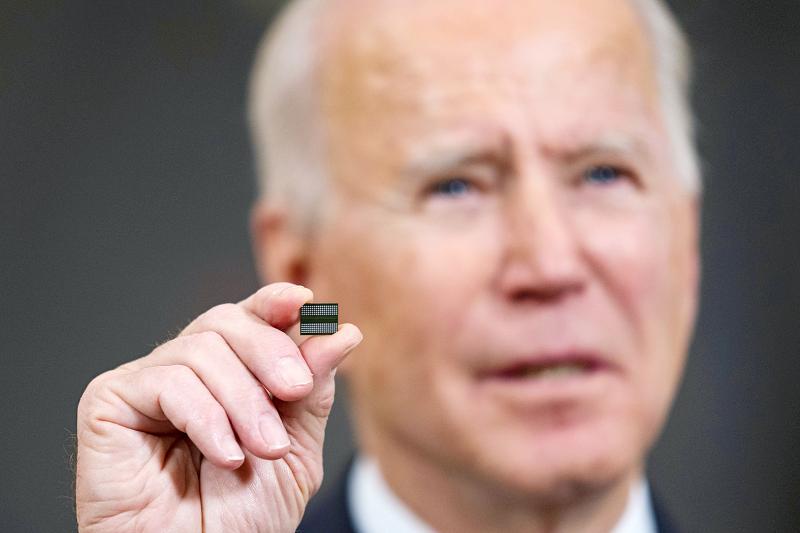US President Joe Biden on Wednesday ordered a review of US supply chains, seeking to end the country’s reliance on China and other adversaries for crucial goods.
However, the process could take months, offering no immediate solution for a shortfall of semiconductors that has idled vehicle production at several US factories.
The Biden administration’s 100-day review is to cover chips, but also large-capacity batteries, pharmaceuticals and strategic materials, such as rare earth elements, a White House statement said.

Photo: Bloomberg
Although Biden did not specifically mention Taiwan on this occasion, the US last month appealed to Taiwan to help with the semiconductor shortages.
Media outlets such as Japan-based Nikkei Asia have also reported that Washington is expected to pursue partnerships with Taiwan, Japan and South Korea in chip production.
Minister of Economic Affairs Wang Mei-hua (王美花) has reiterated that Taiwan is a reliable economic partner of the US.
“When it comes to the semiconductor industry, information and communications technology products, and biotech, the US and Taiwan have a track record of working closely together,” Wang said. “We are undeniably trustworthy partners.”
The signing of a memorandum of understanding regarding Taiwan-US economic prosperity would deepen bilateral ties, Wang added.
As a long-term and reliable partner of the US, the government would continue to work with Biden’s administration to deepen Taiwan-US global partnership and trade ties, Ministry of Foreign Affairs spokeswoman Joanne Ou (歐江安) said yesterday in a statement.
A US-Taiwan alliance in the semiconductor field would be good news for Taiwanese firms, said Liu Pei-chen (劉佩真), a researcher at the Taiwan Institute of Economic Research (台灣經濟研究院).
Biden’s review is not aimed at China or any other specific country, but instead focuses on diversifying supply more generally, said White House officials, who spoke on condition of anonymity.
Still, an overreliance on China and other adversaries for critical goods is a key risk that must be addressed, they said.
Biden met with US lawmakers at the White House to discuss the semiconductor shortage and ways to bolster supply chains.
US Senate Majority Leader Chuck Schumer said that he is asking the chamber’s top lawmakers to draw up legislation aimed at improving US competitiveness with China in manufacturing and technology, including bolstering the supply of US-made semiconductors.
The US semiconductor industry has been pushing Biden to include tax breaks and other financial incentives in his next legislative package to spur investment and research in the US — an effort that would take months to move through the US Congress.
Biden’s order would also direct industry-specific reviews focused on defense, public health and biological preparedness, as well as information and communications technology, transportation, and energy and food production, the White House said.
Those assessments, to be completed within one year, would be modeled after reviews that the US Department of Defense uses to regularly evaluate the US defense industry.
Additional reporting by Angelica Oung, Lin Chia-nan and CNA

Rainfall is expected to become more widespread and persistent across central and southern Taiwan over the next few days, with the effects of the weather patterns becoming most prominent between last night and tomorrow, the Central Weather Administration (CWA) said yesterday. Independent meteorologist Daniel Wu (吳德榮) said that based on the latest forecast models of the combination of a low-pressure system and southwesterly winds, rainfall and flooding are expected to continue in central and southern Taiwan from today to Sunday. The CWA also warned of flash floods, thunder and lightning, and strong gusts in these areas, as well as landslides and fallen

MASSIVE LOSS: If the next recall votes also fail, it would signal that the administration of President William Lai would continue to face strong resistance within the legislature The results of recall votes yesterday dealt a blow to the Democratic Progressive Party’s (DPP) efforts to overturn the opposition-controlled legislature, as all 24 Chinese Nationalist Party (KMT) lawmakers survived the recall bids. Backed by President William Lai’s (賴清德) DPP, civic groups led the recall drive, seeking to remove 31 out of 39 KMT lawmakers from the 113-seat legislature, in which the KMT and the Taiwan People’s Party (TPP) together hold a majority with 62 seats, while the DPP holds 51 seats. The scale of the recall elections was unprecedented, with another seven KMT lawmakers facing similar votes on Aug. 23. For a

WAITING GAME: The US has so far only offered a ‘best rate tariff,’ which officials assume is about 15 percent, the same as Japan, a person familiar with the matter said Taiwan and the US have completed “technical consultations” regarding tariffs and a finalized rate is expected to be released soon, Executive Yuan spokeswoman Michelle Lee (李慧芝) told a news conference yesterday, as a 90-day pause on US President Donald Trump’s “reciprocal” tariffs is set to expire today. The two countries have reached a “certain degree of consensus” on issues such as tariffs, nontariff trade barriers, trade facilitation, supply chain resilience and economic security, Lee said. They also discussed opportunities for cooperation, investment and procurement, she said. A joint statement is still being negotiated and would be released once the US government has made

All 24 lawmakers of the main opposition Chinese Nationalists Party (KMT) on Saturday survived historical nationwide recall elections, ensuring that the KMT along with Taiwan People’s Party (TPP) lawmakers will maintain opposition control of the legislature. Recall votes against all 24 KMT lawmakers as well as Hsinchu Mayor Ann Kao (高虹安) and KMT legislative caucus whip Fu Kun-chi (傅崐萁) failed to pass, according to Central Election Commission (CEC) figures. In only six of the 24 recall votes did the ballots cast in favor of the recall even meet the threshold of 25 percent of eligible voters needed for the recall to pass,